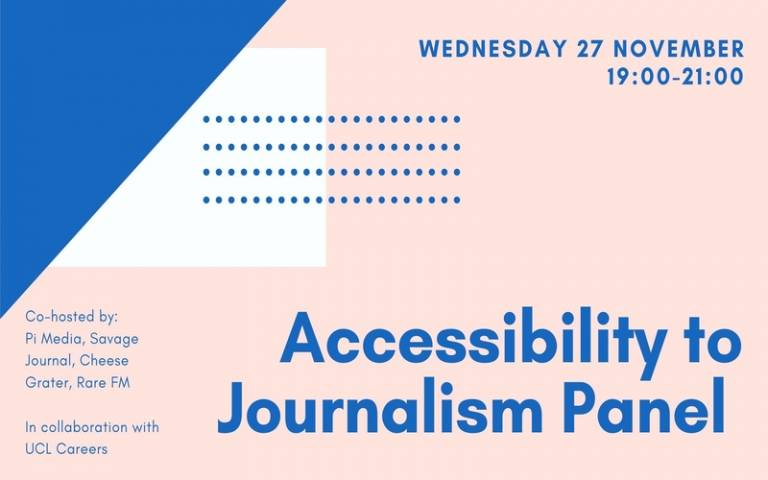Student reviews – Accessibility to Journalism panel event
3 December 2019
Student Journalist Georgina covers this invaluable event – co-hosted by UCL’s student media societies and UCL Careers – on pursuing a career in the media industry.

Aspiring journalists are routinely informed that ‘getting your foot in the door' is really all about ‘who you know’. It’s something which can come as particularly discouraging news to those who don’t have a ready-made network of contacts at their disposal, or the financial means to take up a string of unpaid internships in London.
Impacting diversity in significant ways, these obstacles are littered across the UK media. Current statistics speak for themselves: social enterprise Press Pad finds that an overwhelming 94% of UK journalists are white, just 11% are from working class backgrounds, and 80% of editors were privately educated.*
For this reason, Pi Media sought to address the lack of diversity in the newsroom. At the free Accessibility to Journalism panel event, Pi Magazine editor Kinzah Khan chaired a discussion on the challenges facing aspiring journalists, sharing tips on how to stand out from the crowd and their own experiences in the fast-paced and often challenging line of work. The guests brought a range of professional insight to the table; Helier works as a senior journalist for the BBC international news website, covering stories as big as the Tham Luang cave rescue in Thailand, while Andrea is a magazine journalist and influencer who specialises in lifestyle.
Though there’s no one path into journalism (Helier worked as a civil servant for a few years before changing route) they concluded that internships and work experience are certainly important. But nepotism, they agree, will often propel others up the career ladder. On top of this, Andrea explains that she herself wouldn’t have been able to intern at 21.
Building transferable skills and keeping up freelance work means it’s now a possibility for her; having secured a front page story at the staple London magazine Time Out as well as running her popular blog The Haute Heel, learning how to promote a website certainly kept her on the playing field. Now 27, she stresses the importance of being there for others, and demonstrating a can-do attitude and unshakeable commitment to the industry. Working your way in is definitely easier with a masters degree in journalism, she says, though this isn’t financially feasible for everyone.
There are further obstacles facing people of colour – including, the guests suggest, unconscious bias in hiring practices. Helier’s advice is to focus on being a good candidate, and building an impressive portfolio and skillset. On the topic of networking, she also suggests asking strangers for help, whether this be for general tips or even advice prior to salary negotiations.
While diversity schemes don’t necessarily equal mentorship or candidates staying in their roles, she continues, success can be found by getting your name out there and being likeable to boot. Andrea also insists that aspiring journalists should make sure they’re “all in” – resilience and passion is key. Ending on a motivational note, she points out that young people have more space to explore their options at university, while Helier adds that the opportunity to tell interesting stories keeps her going.
Despite working in different sectors of the industry, the guests agree on many pointers – including that no journalist should ever miss a deadline. It’s fitting, then, that Helier left a little early to work her night shift.
By Georgina Bartlett
 Close
Close

